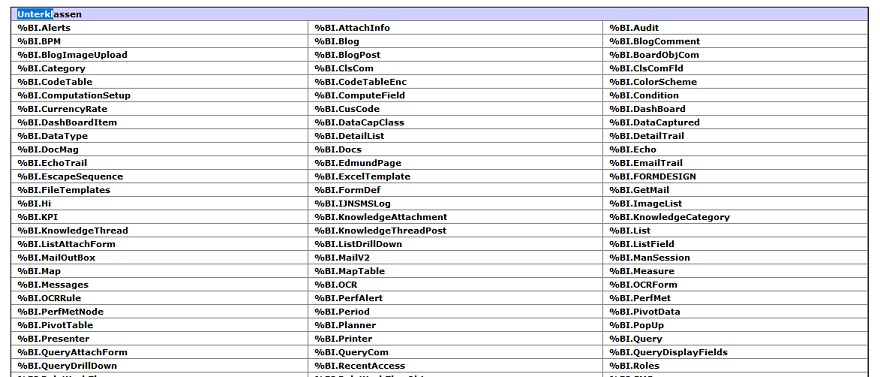high comfort service ! ![]()
- Log in to post comments
high comfort service ! ![]()
ClassReference of %Library.Persistent shows it as sub classes
http://docs.intersystems.com/latest/csp/documatic/%25CSP.Documatic.cls?…

Tom.
In a similar situation I changed only one of the Serial classes to %RegisteredObject.
Compilation was fine:
Next I changed it back to %SerialObject.
Complation was fine again. And remained fine.
![]()
excellent help
very useful
Pls. don't forget to mark your question as "answered" on Developer Community,
please click the checkmark alongside the answer you (as author of the question) accept
Pls. don't forget to mark your question as "answered" on Developer Community,
please click the checkmark alongside the answer you (as author of the question) accept
Pls. don't forget to mark your question as "answered" on Developer Community,
please click the checkmark alongside the answer you (as author of the question) accept
Pls. don't forget to mark your question as "answered" on Developer Community,
please click the checkmark alongside the answer you (as author of the question) accept
Pls. don't forget to mark your question as "answered" on Developer Community,
please click the checkmark alongside the answer you (as author of the question) accept
Pls. don't forget to mark your question as "answered" on Developer Community,
please click the checkmark alongside the answer you (as author of the question) accept
Pls. don't forget to mark your question as "answered" on Developer Community,
please click the checkmark alongside the answer you (as author of the question) accept
Pls. don't forget to mark your question as "answered" on Developer Community,
please click the checkmark alongside the answer you (as author of the question) accept
Pls. don't forget to mark your question as "answered" on Developer Community,
please click the checkmark alongside the answer you (as author of the question) accept
Pls. don't forget to mark your question as "answered" on Developer Community,
please click the checkmark alongside the answer you (as author of the question) accept
Pls. don't forget to mark your question as "answered" on Developer Community,
please click the checkmark alongside the answer you (as author of the question) accept
Pls. don't forget to mark your question as "answered" on Developer Community,
please click the checkmark alongside the answer you (as author of the question) accept
Pls. don't forget to mark your question as "answered" on Developer Community,
please click the checkmark alongside the answer you (as author of the question) accept
Pls. don't forget to mark your question as "answered" on Developer Community,
please click the checkmark alongside the answer you (as author of the question) accept
Pls. don't forget to mark your question as "answered" on Developer Community,
please click the checkmark alongside the answer you (as author of the question) accept
Pls. don't forget to mark your question as "answered" on Developer Community,
please click the checkmark alongside the answer you (as author of the question) accept
Pls. don't forget to mark your question as "answered" on Developer Community,
please click the checkmark alongside the answer you (as author of the question) accept
Pls. don't forget to mark your question as "answered" on Developer Community,
please click the checkmark alongside the answer you (as author of the question) accept
not a problem of version
A subquery using ORDER requires a TOP clause
Change the query to
SELECT *
FROM
(SELECT TOP ALL
sslog.userRowid,
sslog.CreateDate,
sslog.CreateTime,
Sslog.SSUSR,
sslog.Terminal,
ssuser.Initials,
ssuser.USName
FROM SUser_Log sslog
LEFT JOIN DHC_SSuser ssuser ON (Sslog.SSUSR = ssuser.userRowid
OR sslog.ssusr = ssuser.Initials
OR sslog.ssusr = ssuser.USName)
WHERE ssuser.USName ['admin'
ORDER BY sslog.CreateDate DESC)
WHERE %VID> 5HI Dave,
Great to meet you again on one of my favorite subjects. ![]()
![]()
To mark your question as "answered" on Developer Community,
please click the checkmark alongside the answer you (as author of the question) accept.
You have 2 Options for LOCK
1) LOCK lockargument
either you succeed or you hang until you get success or forever
2) LOCK lockargument:timeout
timeout releases your attempt after the defined time
and signal by system variable $TEST if you were successful or not
so your code may have this structure
more on LOCK: http://docs.intersystems.com/latest/csp/docbook/DocBook.UI.Page.cls?KEY…
if failing you may want to identify your competitor using ^$LOCK
http://docs.intersystems.com/latest/csp/docbook/DocBook.UI.Page.cls?KEY…
given the property you want to sort is unique and suitable as key for your array you may get the expected result.
To mark your question as "answered" on Developer Community, please click the checkmark alongside the answer you (as author of the question) accept.